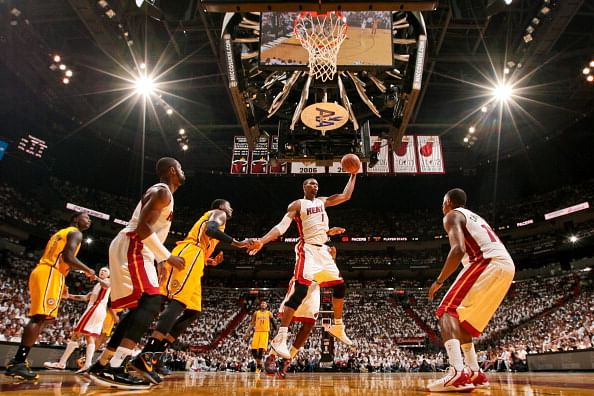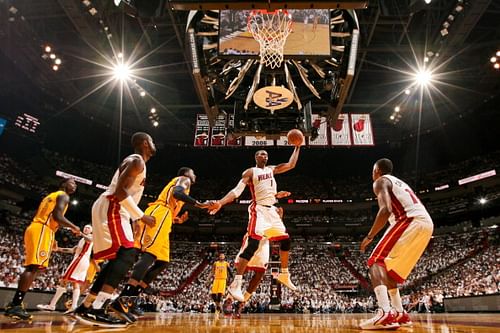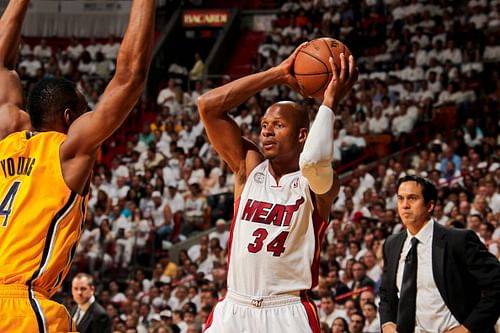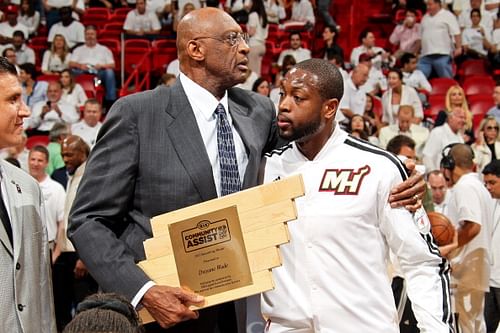
Pacers v/s Heat Game 2: Talking Points

2.2 seconds is a world of time in play-off basketball. A lesson that Frank Vogel and his team had to learn the hard way in Game-1 of the Eastern Conference Finals. Many questions were raised about Vogel’s strategies, specially about his choice of leaving Roy Hibbert out of the game in anticipation of the fact that Hansbrough was a better option to guard against Chris Bosh‘s mid-range pull-up shots. LeBron was just smarter as he realized that 2.2 seconds was enough for him to take a dribble and get to the rim. He was in no mood to hand it off to Bosh and take the chance. It was in his power to close the game and he chose to do so by ruthlessly exposing and exploiting the strategic blunder made by Vogel and the over-exuberant positional error made by George.
George was openly apologetic in the post-game press conference and admitted his mistake. Vogel however, still defended his strategy and just bemoaned the fact that the Heat just did something smarter. However, he seemed to have understood one important lesson. It was a hell of a feat for them to diffuse the offensive threat of Melo and the Knicks, but LeBron and the Heat are a far more intelligent team. They adapt quicker and are ruthless with their execution. To add to this, they have quite possibly the league’s hardest working coach, and by all means he would have gone through more tape about the Pacers than the Pacers could stack up themselves. The lesson was maybe rude, but its veracity and verisimilitude was unquestionable. The Miami Heat didn’t win 65 games without reason. They are one of the smartest teams in the league; a team that could throw multiple line-ups at opposition; adapts and excels against the toughest of defenses and play the game with an unparalleled energy and intensity.
The Pacers were the dark-horses but they have done enough to prove that they are no push-overs. They were still smarting from their overtime loss, but felt encouraged and reassured about their own game and the legitimacy of them being the strongest contenders to the Heat in the Eastern Conference. They took a lot of heart from the effort and belligerence exhibited by Paul George, the energy and intensity of Roy Hibbert and just the inconsistent yet assuring burst of excellence by the role-players like Stephenson and Hansbrough. The Heat may have stolen Game-1 and while the media raved about the clutch closure performance of LeBron, the Pacers were finding their own niche and had developed the confidence that if they could run the Heat that close, they could also cause an upset. The blue-collars were up, and the stripes were theirs’ to be earned. In Game-2 they looked like a team with a plan, and they played like a team on a mission.
The talking points of the game:
Defensive Intensity

The Miami Heat are maybe the equal to the Clippers when it comes to scoring easy points on transition plays. They also boast of one of the league’s most menacing half-court defense, and against the Pacers it is essential that they play defense at a high intensity and force turnovers and easy transition opportunities. The Pacers are the best defensive team in the league, and their strength, speed and size can’t be easily negated in a half-court set offensive set. Spoelstra knew that well enough and all game long he kept on raging his team to play harder and tougher defense. Vogel, on the other hand, was just pushing and egging his team to go and get the loose and fifty-fifty balls, to be more aggressive and try to win it at the defensive end of the floor. What followed was a sequence of maybe the best defense I have seen since the Pacers-Sixers second-round series of 2001. The wing defenders were aggressive and swatting at every sight of the ball, the rotations were quick, the screen defenders jumped out on every screen, the boards were contested strongly. The defense was smart as both teams chose to play physical without sending players to the charity stripe; forcing teams to shoot forced shots deep into the shot-clock and forcing low-percentage shots.
The offense was scrappy and every single shot was huge. The Pacers were able to hold the Miami Heat to just 46% shooting from the field, and allowed only 73 Field Goal attempts. They disrupted Miami’s offense, forcing them to take ill-advised three-pointers and pull-up jumpers, managing to hold the Heat to only 7-22 from beyond the arc. They forced Miami into 14 turn-overs while bailing them out with 26 visits to the Free Throw line. The Heat were no less imposing on the defensive end, holding the Pacers to only 66 Field Goal attempts. The Pacers may have managed to shoot 50% from the field, but by no means was the offense pretty. Hill and Augustin continuously floundered in the face of the pestering defense of Chalmers, Wade and Cole. This, for me, was maybe the finest exponent of play-off defense that one can hope to witness.
Hibbert was huge

Roy Hibbert was just huge in this game, scoring 29 points on 10-15 from the field, managing to rake in 10 rebounds and also going an amazing 9-10 from the Free Throw line. With Spoelstra reluctant to play Anderson for longer minutes and choosing to go with his small line-up, that meant that Bosh was on Hibbert and he had a hay day against the 6’10” Forward. He grabbed 6 offensive boards, and his imposing figure was a major thorn in the flesh of LeBron and company all night-long. His presence also bottled up the paint for LeBron and Wade, and while Bosh may have benefited by his reluctance to leave the paint and guard Bosh on the perimeter, Hibbert did enough to supersede any influence Bosh may have had with his perimeter shooting. The Pacers chose to use Hibbert’s size against Bosh on the block and the move paid them rich dividends.
LeBron had another of his fourth quarter moments

LeBron was maybe the brightest spark for the Heat. He did it all – he shot the big-shots, spectacularly blocked a Roy Hibbert throw-down dunk, used his defensive adaptability to great effect to snuff out the influence of David west and allow Spoelstra to play his favored small line-up, scored at will and was solely responsible for bringing the Heat back into the game. The Heat were a no presence in the paint in the first half, managing only 14 points in the paint, after almost living there and scoring 60 in Game-1. The points in the paint needed to change and LeBron was at the forefront of that, driving into the lane, scoring off hand-offs and just dominating using his uber-athletic human freight-train dynamics. He was bigger in the fourth quarter as he brushed aside George on two occasions to hit clutch lay-ups in the dying minutes. 36 points, 8 rebounds, 3 steals, 1 blocked shot and 3 assists. LeBron was doing his MVPesque stuff and the Pacers were just hoping against hope that he doesn’t repeat his Game-1 heroics. Hell, he even won a tip over 7’2” Roy Hibbert. It seemed destined that LeBron would again come up with another great performance to close out the game. Everyone believed the same, but for maybe LeBron himself.
With the Heat down one and in the last 40 seconds of the game, LeBron committed two costly turn-overs that very much settled the game’s fate. Well, many would give him a pass because you know it is LeBron and that doesn’t happen often. But if one carefully notices the sequence of plays, one can hardly fail to notice that it was just about LeBron having another of his fourth quarter moments. He chose to drive and dish rather than get to the rim and finish. He chose to give up the ball in the last minute of the game again, uncharacteristic of the league’s MVP, but so true to LeBron. After Game-1 LeBron had stated that his decision to take the ball to the ring and score the two crucial lay-ups had nothing to do with the fact that Hibbert was on the bench. He proudly stated that he would have done the same had Hibbert had been on the floor and that he just didn’t care about Hibbert.
Today, when Hibbert was on the floor and anchoring the paint, LeBron failed to stand true to his words. He chose to drive and dish, forcing cross-court passes that David West was able to intercept. It may not seem so criminal because LeBron maybe made the right play in terms of the game’s fundamentalists. He drew the defense to himself, and chose to find the open spot-up shooter in Ray Allen. I guess he didn’t do much wrong in terms of pure basketball. It was maybe unfortunate that he couldn’t make the pass, which, if completed, would have had Ray Allen with a set-shot on the perimeter. The problem isn’t the decision as much as the mentality.
With the game on the line do you want your best player to give the ball up? Would Iverson, Jordan, Kobe or West have given the ball up? Was LeBron scared to shoot his nemesis fourth quarter free-throws? Did he pass because he just chose to go back into a cocoon again and revert from being the closure that he is raved about? Did any Miami Heat fan want Ray Allen, despite his hyperbolic shooting credentials, to have the ball over LeBron?
Dwayne Wade was a no-presence

The game started with Wade being felicitated with the 2012-13 Season long Kia Community Assist Award, as recognition of his outstanding efforts in the community and his ongoing philanthropic and charitable work. The award just seemed to ride too much into his performance as he just turned out to be too meek and charitable for the Heat’s liking. Wade may have been harshly criticized on many occasions in the play-offs about his lack of productivity and his drop in scoring numbers. The fact is that he just has assumed another role, to be the Robin to LeBron, be an enforcer on the defensive end, be the vocal leader on the team and try to find his own offense when he feels the team needs a momentum shift. He isn’t at his prime fitness level, but still remains the second-best shooting guard in the game. This season, he has averaged a career-low in play-off numbers, averaging 13.7 ppg against a career play-off average of 24.4 ppg. His free-throw numbers have also dropped drastically, as he averages only 3.1 free-throw attempts a game and is averaging only 67% from the charity stripe. He has only attempted a single three-point shot in the whole of the play-offs till now and just seems to have turned into a one-dimensional slash and dash player.
There are no more signature step-back jumpers being launched and, with that, Wade has taken away one of his most dangerous offensive moves. He still has managed to score and come up big in important play-off moments in this campaign. However, when the Heat won the Championship last year, Wade was doing much better and still managed 22.8 ppg, on 46% shooting. LeBron was around still then, so certainly his dominance on the offensive end can’t be a factor. In today’s game, Wade scored 14 points on 6-14 shooting. The numbers however don’t tell the full story. Wade was struggling with his offense all night long, refused to take the jump-shots and chose to be too much of a provider and play-maker. So much so, that Stephenson was almost giving him open space to encourage him to shoot, but Wade still tried to force the ball inside. He may have been a huge presence on the defensive end of the floor, but Miami need Wade to get his offense going to get through the stubborn Pacers.
The other major story-lines were also about Lance Stephenson oscillating between rash and clutch, and Paul George again exhibiting the rapid strides he has made. Thankfully, all the headlines till now have been about basketball and it has been great play-off basketball till now. The series now shifts to Indiana where the Pacers would look to seize the advantage and the Heat would look for redemption.
The Finals has certainly lived up to the expectations and one can only see it getting better. Paul George v/s LeBron was the toast of Game-2 and Hibbert was the biggest positive of the game. How will Game-3 span out? Let the predictions begin.